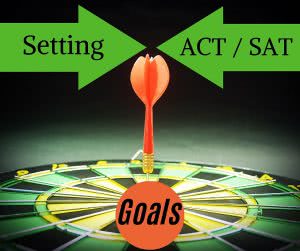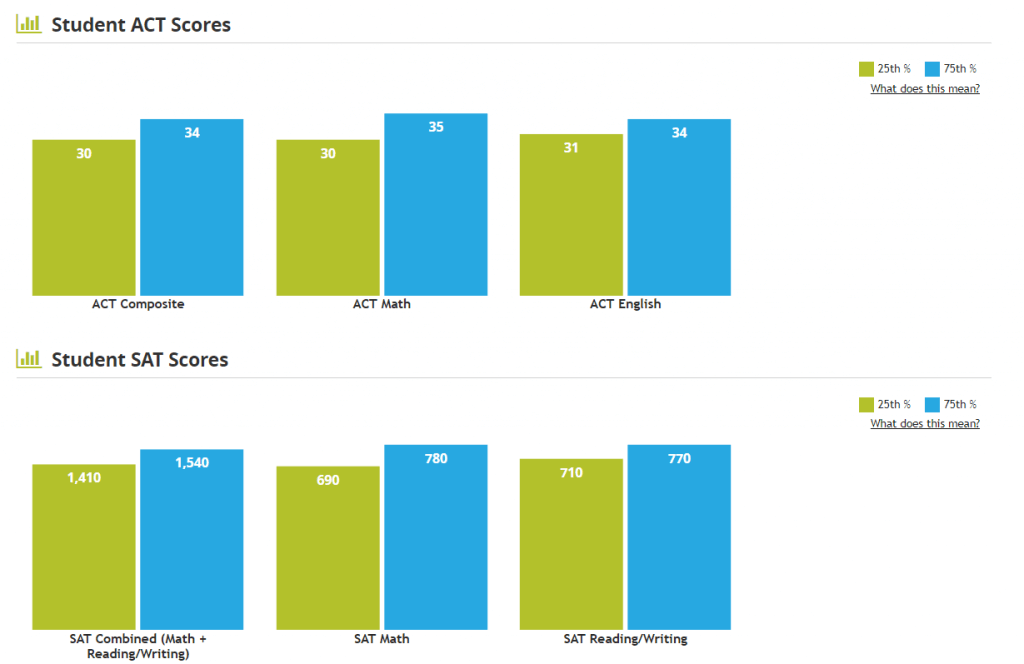
Setting ACT and SAT goals is more important than students tend to realize. Of course, you want to do the best you can on either exam, but getting a “good score” means different things to different students. Setting ACT/SAT goals helps you stay motivated and gives you something to aim for. Here are some tips to set your own goal posts when it comes to these standardized tests.
What is a Good SAT or ACT Score?
The definition of a “good SAT score” or “good ACT score” can mean vastly different things to various students. A near perfect score may be “good” to one student, while another considers anything above the average a “good” result. So how can you define this for yourself?
The median scores of each exam can give you some insight to start with. For 2023 graduates, for example, the average SAT score was 1028 out of 1600. For the ACT, it was 19.5 out of 36. If you score higher than either of these, you’re doing better than 50% of other test-takers.
Your practice test results should give you a good foundation to work from. You likely took the PSAT. How did you stack up against others who took the test? How well did you do overall? For the ACT, you’ll likely want to take a practice test on your own. Reviewing these results can give you a game plan for improvement.
A third factor you should consider is, “What are your colleges looking for?” Many schools release the previous years’ accepted students’ ACT and SAT score ranges. By looking at these numbers, you can see what scores you personally need to aim for to improve your chances of getting accepted.
How you define a “good” score is up to you, but considering these three factors can help you see a path forward to improving your SAT and ACT results and getting a score you’re happy with.
Why is Setting Goals Important?
Goals, no matter the task, provide a wealth of benefits. When you already have a full to-do list during your senior year, setting goals for your SAT or ACT score can be key to getting a score that increases your acceptance chances to your dream college.
In general, goals can help you:
- Keep procrastination at bay
- Sustain momentum
- Stay motivation
- Monitor your progress
- Find direction
- Improve overall testing performance
- Focus
Once you reach your SAT or ACT goals, you’re always welcome to set a higher one if you have time to take the test again.
How to Set a Realistic ACT/SAT Score Goal
To set a realistic ACT/SAT score goal, you need to first understand where you are. Practice exams and the PSAT can help here. As mentioned previously, these results give you a springboard to jump from. With the right preparation and studying, your scores should only improve.
However, simply saying “I want to score higher” isn’t really a strong goal. It’s not tangible. A single point is technically scoring higher.
And, you also want your goal to be realistic. If you scored a 1590 the first time you took the SAT, a 1600 might be a realistic goal. If you scored a 1090, however, 1600 might be tough. You can become discouraged if you set your sights too high.

The average SAT and ACT scores for Swarthmore College
The best way to set an ACT/SAT score goal is to make it S.M.A.R.T. Here are some tips for doing just that:
- S: Specific. Outlining exactly what you want to achieve will help you find direction going forward. How well do you want to do on each section of the test? What overall score are you looking for by the time you’re ready to submit college applications?
- M: Measurable. By taking practice tests and real exams, you’re making your ACT/SAT goals measurable. You can see your progress as time goes on.
- A: Achievable. As mentioned above, you need your goal to be realistic and achievable. It’s perfectly okay to start out small and then aim higher once you reach that goal post.
- R: Relevant. How is your ACT/SAT score goal relevant to your other goals? One way to look at this is to make a goal that is relevant to what your potential school looks for in an applicant.
- T: Time-Bound. You only have so much time to reach your ACT/SAT goals – by the time you need to turn in your college applications. Colleges won’t accept results after that date. Keeping that deadline in mind can help you stay motivated.
Simply “scoring higher” isn’t a strong ACT or SAT goal. If you want it to be achievable, you need to make it specific and realistic while also keeping an eye on deadlines and your overall progress. With the right game plan now, you can go after earning the ACT or SAT score you want.
It’s important to know what colleges are looking for in a student if you want to increase your chances of getting accepted. Many schools still require the ACT or SAT. Our College Match resource shows you how you compare to other students who are applying to the same colleges. Use it today for free.





